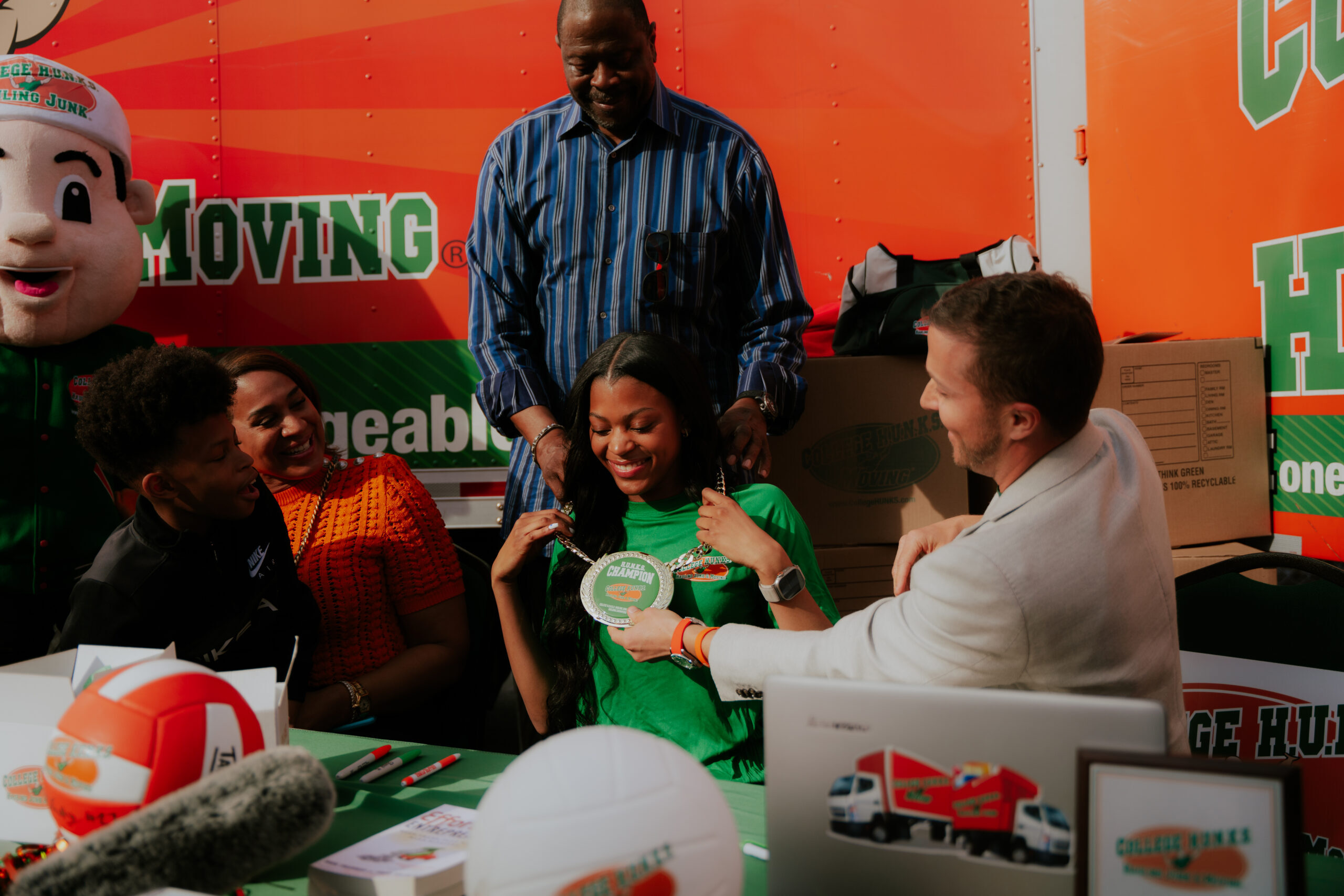Nick Friedman and Omar Soliman are well known for their success as entrepreneurs. They appeared on the first episode of “Shark Tank.” They’ve grown College HUNKS Hauling Junk & Moving, the company they started in 2005, from a small operation to a brand with franchises in more than 40 states.
Friedman and Soliman are also innovators in another way.
In 2023, College HUNKS signed a Name, Image and Likeness deal with Alexis “Lexi” Ewing, a star volleyball player from Bullis School in Potomac. According to College HUNKS, Ewing’s deal was the first-ever NIL deal signed by a high school athlete in Maryland.
Ewing appeared in a photo shoot with Friedman with a College HUNKS truck and company signs behind them. Local TV stations interviewed her. The New York Post and Washington Post wrote articles about Ewing that mentioned College HUNKS.
It made sense for College HUNKS to explore high school NIL with Ewing, a high school senior who has committed to play volleyball at Penn State. Friedman and Ewing’s mother Cheryl Weaver were high school classmates at Sidwell Friends School in Bethesda. Ewing’s father, Patrick Ewing, was a basketball star for Georgetown University and the New York Knicks. Patrick Ewing is a member of the Naismith Basketball Hall of Fame.
Friedman recalled the first conversation about NIL with Weaver.
“Look, we’re not a big brand.’ And by the way, Lexi doesn’t have a huge [social media] following yet, and it’s not like we have a big check that we can write her,” Friedman said he told Lexi’s mom. “For this to be beneficial mutually, it has to be, ‘This is going to be her first deal.’ Maybe it could be some sort of first in Maryland as well.”
The College HUNKS deal highlights how some businesses are thinking about NIL and high school students. In the eyes of some business owners, it’s new and untested. Return on investment is uncertain, but they don’t want to miss an opportunity.
“They might be looking to generate leads or direct sales or new visibility for the brand,” said Bill Carter, founder of Student-Athlete Insights which advises athletes and their families about NIL.
Carter, who is a member of the advisory board of the Shirley Povich Center for Sports Journalism, noted that social media is the top priority for companies when deciding which athletes to engage in NIL deals.
“Nine times out of 10, or eight times out of 10, what they’re really looking for is some form of consumer engagement,” he said, adding that NIL often provides a cost-effective way for companies to reach customers on social media.

Companies that have signed high school athletes to NIL deals range from national brands (Nike, Adidas, Puma, Gatorade) to smaller companies. In Oregon, Portland Gear, an apparel brand, signed high school basketball stars Sofia Bell and Jackson Shelstad to NIL deals in 2022 when they were seniors. At the time, both had committed to playing at the University of Oregon. In a press release, Portland Gear said it was “the first brand in the state” to do an NIL deal with a high school athlete.
Leaf Trading Cards, based near Dallas, has deals with 50 to 60 high school athletes, according to company president Josh Pankow. Leaf produces cards for each player and distributes them in packs found in stores nationwide.
High school players working with Leaf include California’s trailblazing football player Bella Rasmussen, one of just 359 girls playing 11-person football in the state (compared to 90,000 boys) as well as recent top quarterback prospects Jaden Rashada, Julian Lewis and Trae Taylor.
“NIL really became an opportunity to go after some of these kids before they were huge stars, so that we could build relationships with them, get to know them, get to know their family,” Pankow told Capital News Service.
“ NIL really became an opportunity to go after some of these kids before they were huge stars.”
While Leaf’s current marketing strategy primarily targets highly-ranked quarterbacks, Pankow believes the evolution of NIL will induce a trickle-down effect for players with less national attention.
“It’s hard to keep up with [high school stats]. It’s not like college or the NFL, where you can just pull up your phone and look at your ESPN app and say, ‘OK, he’s got 82 rushing yards through three quarters,’” Pankow said. “I don’t think we’re too far away from ESPN potentially even having a channel that just shows high school games. As more money gets poured into it, we’re only at the tip of the iceberg. There’s still so much that can be done for high school.”


You must be logged in to post a comment.